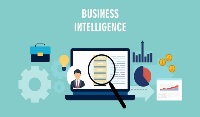Business Intelligence Developer Definition
- Tenri Anisa
- 2023 March 15T02:23
- Business Intelligence Developer

Business Intelligence Developer Definition: Understanding the Role and Responsibilities
Business Intelligence (BI) developers are responsible for designing, developing, and implementing business intelligence solutions that help organizations make informed decisions. These professionals use various technologies and tools to collect, analyze, and report on data from different sources.
In this article, we'll explore what a business intelligence developer does, the skills required for this role, and the responsibilities they have in an organization.
What is a Business Intelligence Developer?
A business intelligence developer is an IT professional who is responsible for designing, developing, and implementing data solutions to support business operations. This role requires a strong understanding of data analysis, data modeling, and database design, as well as experience with various BI technologies and tools.
BI developers work with business stakeholders, data analysts, and IT teams to understand business requirements, design data solutions, and implement BI tools and dashboards. They also ensure that data solutions are scalable, secure, and reliable.
Skills Required for Business Intelligence Developer
Business intelligence developers require a combination of technical and business skills. Here are some of the skills required for this role:
-
Data analysis: BI developers must have a strong understanding of data analysis techniques and tools to analyze data from different sources and transform it into actionable insights.
-
Data modeling: BI developers must be proficient in data modeling and database design, as they are responsible for designing and implementing data solutions that support business operations.
-
Business acumen: BI developers must understand the business needs and requirements to develop BI solutions that align with organizational goals.
-
Programming languages: BI developers must have experience with programming languages such as SQL, Java, Python, and R to develop data solutions and automate data processing tasks.
-
BI technologies and tools: BI developers must be familiar with various BI technologies and tools such as Tableau, Power BI, QlikView, and Oracle BI to create reports and dashboards.
-
Communication skills: BI developers must have excellent communication skills to collaborate with business stakeholders and IT teams to understand business requirements and develop data solutions.
Responsibilities of Business Intelligence Developer
The responsibilities of a business intelligence developer vary depending on the organization's size, industry, and specific requirements. Here are some of the common responsibilities of a BI developer:
-
Designing and developing data solutions: BI developers are responsible for designing and developing data solutions that support business operations. This includes designing data models, building ETL pipelines, and developing data visualization tools.
-
Collaborating with business stakeholders and IT teams: BI developers must collaborate with business stakeholders and IT teams to understand business requirements and develop data solutions that align with organizational goals.
-
Implementing BI tools and dashboards: BI developers must implement BI tools and dashboards that provide insights into key business metrics and KPIs.
-
Monitoring data solutions: BI developers must monitor data solutions to ensure that they are scalable, secure, and reliable. They must also troubleshoot and resolve any issues that arise.
-
Continuous improvement: BI developers must continuously improve data solutions by incorporating feedback from business stakeholders, implementing best practices, and staying up-to-date with emerging technologies and trends.
Conclusion
In summary, a business intelligence developer is responsible for designing, developing, and implementing data solutions that support business operations. This role requires a combination of technical and business skills, including data analysis, data modeling, programming languages, and BI technologies and tools. BI developers must also have excellent communication skills to collaborate with business stakeholders and IT teams. The responsibilities of a BI developer include designing and developing data solutions, collaborating with stakeholders and IT teams, implementing BI tools and dashboards, monitoring data solutions, and continuously improving data solutions.